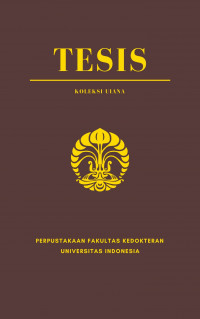Tesis
Validasi Duke Clinical Score sebagai Prediktor Infeksi Bakteri Family Enterobacteriaceae Penghasil Enzim Extended-Spectrum Beta-Lactamase pada Pasien di Intensive Care Unit RSUPN Dr. Cipto Mangunkusumo = Validation of Duke Clinical Score as predictor of extended - spectrum beta – lactamase - producing Enterobacteriaceae infection in intensive care unit, Cipto Mangunkusumo general teaching hospital.
Latar Belakang: Prevalensi infeksi yang disebabkan oleh multidrugs resistent microorganism (MDRO), terutama bakteri Enterobacteriaceae penghasil enzim extended-spectum beta-lactamase (ESBL) semakin meningkat. Identifikasi yang cepat dan pemberian antibiotik yang tepat, terutama untuk pasien intensive care unit (ICU), dibutuhkan untuk menurunkan lama rawat dan menurunkan angka mortalitas. Duke clinical score merupakan suatu instrumen stratifikasi risiko untuk memprediksi infeksi bakteri Enterobactericeae penghasil ESBL. Duke clinical score pernah diteliti untuk memprediksi infeksi yang didapat dari komunitas, namun belum pernah diteliti untuk pasien ICU. Metode: Penelitian ini merupakan uji diagnostik dengan design kohort prospektif. Subjek penelitian merupakan pasien ICU RSUPN Dr. Cipto Mangunkusumo (RSCM) yang memenuhi kriteria inklusi selama bulan Januari-Maret 2022. Skrining dengan swab rektum untuk melihat adanya infeksi bakteri Enterobacteriaceae penghasil enzim ESBL dilakukan dalam 24 jam pertama perawatan pasien di ICU. Kultur klinis dilakukan sesuai indikasi. Duke clinical score diperiksa pada awal perawatan pasien di ICU. Pasien yang tidak terinfeksi bakteri Enterobacteriaceae penghasil enzim ESBL di awal perawatan di ICU akan diobservasi dan diambil kembali swab rektum pada akhir perawatan di ICU. Penelitian akan menilai sensitivitas, spesifisitas, positive dan negative predictive value (PPV, NPV), area under curve (AUC) receiver operating characteristic (ROC) Duke clinical score. Hasil: Dari 105 pasien yang memenuhi kriteria inklusi, 55% pasien memiliki swab rektum atau kultur klinis yang positif dengan bakteri Enterobacteriaceae penghasil enzim ESBL dalam 24 jam perawatan pertama di ICU sehingga dieksklusi. Total subjek penelitian 47 pasien yang tidak terinfeksi bakteri Enterobacteriaceae penghasil ESBL pada awal perawatan di ICU. Pada nilai cut-off ≥ 8.5, Duke clinical score memiliki sensitivitas 32%, spesifisitas 89%, PPV 67%, NPV 66%. AUC ROC 0.652. Kesimpulan: Duke clinical score tidak valid sebagai prediktor infeksi bakteri Enterobacteriaceae penghasil enzim ESBL pada pasien ICU RSCM.
Kata Kunci: Duke clinical score, Enterobacteriaceae penghasil ESBL, ICU
Background: The prevalence of infections caused by multidrugs resistant microorganisms, especially extended-spectrum-beta-lactamase (ESBL)producing Enterobacteriaceae, is increasing. Rapid identification and proper administration of antibiotics, especially for intensive care unit (ICU) patients, are needed to reduce length of stay and lower mortality rates. Duke clinical score is a risk stratification instrument for predicting infection caused by ESBL-producing Enterobactericeae. Duke clinical scores have been studied to predict community-acquired infections, but have never been studied for ICU patients. Methods: This study was a diagnostic test with a prospective cohort design. The subjects were patients of ICU Cipto Mangunkusumo general teaching hospital (RSCM) during January-March 2022 who met the inclusion criterias. Screening with a rectal swab to see the presence of infection with the ESBLproducing Enterobacteriaceae was carried out within the first 24 hours of admission in ICU. Clinical culture was carried out according to indications. Duke clinical score was examined at the beginning of the patient's treatment in the ICU. Patients who were not infected with the ESBL-producing Enterobacteriaceae at the beginning of treatment in the ICU would be observed and rectal swab would be taken at the end of treatment in the ICU. The study would assess the sensitivity, specificity, positive and negative predictive value (PPV, NPV), area under curve (AUC) receiver operating characteristic (ROC) Duke clinical score. Results: Of the 105 patients who met the inclusion criteria, 55% of them had a positive rectal swab and/or clinical cultures with ESBL-producing Enterobacteriaceae within the first 24 hours of treatment in the ICU. A total of 47 subjects were identified as patients who were not infected with ESBLproducing Enterobacteriaceae at the beginning of treatment in the ICU. At a cut-off value ≥ 8.5, Duke clinical score have sensitivity 32%, specificity of 89%, PPV of 67%, NPV of 66%. AUC ROC 0.652. Conclusions: Duke clinical score is invalid as a predictor of ESBL-producing Enterobacteriaceae infection in ICU RSCM patients.
Keywords: Duke clinical score, ESBL-producing Enterobacteriaceae, ICU
- Judul Seri
-
-
- Tahun Terbit
-
2022
- Pengarang
-
Erlina Soebroto - Nama Orang
Adhrie Sugiarto - Nama Orang
Aida Rosita Tantri - Nama Orang
Yulia Rosa Saharman - Nama Orang
Rudyanto Sedono - Nama Orang - No. Panggil
-
T22144fk
- Penerbit
- Jakarta : Program Studi Anestesiologi dan Terapi Intensif., 2022
- Deskripsi Fisik
-
xvii, 59 hal; ill; 21 x 30 cm
- Bahasa
-
Indonesia
- ISBN/ISSN
-
-
- Klasifikasi
-
NONE
- Edisi
-
-
- Subjek
- Info Detail Spesifik
-
Tanpa Hardcopy
| T22144fk | T22144fk | Perpustakaan FKUI | Tersedia |


Masuk ke area anggota untuk memberikan review tentang koleksi